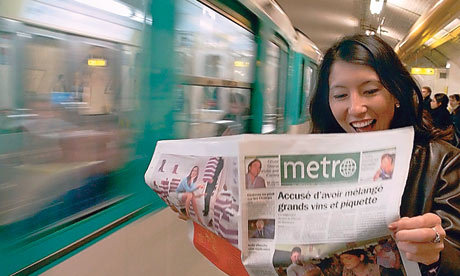All products featured on WIRED are independently selected by our editors. However, we may receive compensation from retailers and/or from purchases of products through these links.

Note 9/9/12 3:37 pm: After I posted this, a couple people on Twitter pointed out that the Thatcher quote may be wrongly attributed to Thatcher instead ofBrian Howard. I changed my copy accordingly (see strikeouts below), but left the quote from review intact.
Two days ago PD Smith, author of the magnificent City: A Guidebook for the Urban Age, published a particularly rich review of "Straphanger: Saving Our Cities and Ourselves From the Automobile," by Taras Grescoe. Smith's opening confirms something unfortunate about my own country even as it offers some hope we might join the wiser: tells me something newly horrid about Maggie Thatcher:
It's not all bad. Both Smith's review and, I take it, Grescoe's book emphasize an encouraging move away from this idiocy. Even the U.S. is seeing a drop in its (ludicrously high) rate car ownership (5 autos to every 4 people), particularly among Americans in their twenties. More people here are using mass transit than ever; by the Brian Howard metric (mis?)attributed to Thatcher , over half the people in New York are failures, including the mayor; streetcars "are being reintroduced in such unlikely places as Houston and Denver."
We remain way behind,, though, and even our best systems fall short of some of the worst in Europe. The London Underground is hardly considered the best or brightest of European systems. (Forgive me, UK friends, for mashing you into Europe for convenience here.) The beloved Tube is old and crowded and loud, and hot in summer. But after using it for a year and returning to the U.S., I was dismayed at how infrequent and unreliable the service seemed in Washington and New York and the Bay Area, all supposedly among our best. I'm glad that more Americans are riding these rails but wish these systems came closer to standards set by countries with far less wealth. If Americans could enjoy for a year the convenience of trains that go almost anywhere at almost any time, as I did in the UK (which train system, again, pales to some systems on the Continent), I think most would be loathe to turn back. (Ditto with the healthcare over there.) Yet rather than join the modern world, many of our leaders are actively killing rapid transit and high-speed rail systems, refusing funds that would speed transit in their states and create jobs as well. Would they were as wise as some of our neighbors way down south:
Public space, of course, is something the US right seems reluctant to recognize, much less invest in. Sharing public transport acknowledges what Barack Obama insisted on in his convention speech and Mitt Romney wants us to ignore: We share not just space but infrastructure, not just location but a society. The small niceties — offering one's seat to someone older or less fit, answering a visitor's questions about where to eat — connect inevitably to larger issues of civility and decency, like whether Rosa Parks should have to sit in the back of the bus, or whether we should all get healthcare and education.
Perhaps the most toxic thing about the American obsession with the car — which is saying a lot — is its encouragement of the fantasy that we are completely independent individuals whose agency and fate depends only on our own decisions about where to go and how fast. Freedom and independence! What a childish fantasy. Especially when so often it leads us to sit stranded on frozen rivers of pavement, surrounded by thousands of others doing the same, isolated and insulated from one another in our expensive little bubbles.
Image: Commuter on Paris Metro, Eric Feferberg/EPA, public domain, via Guardian